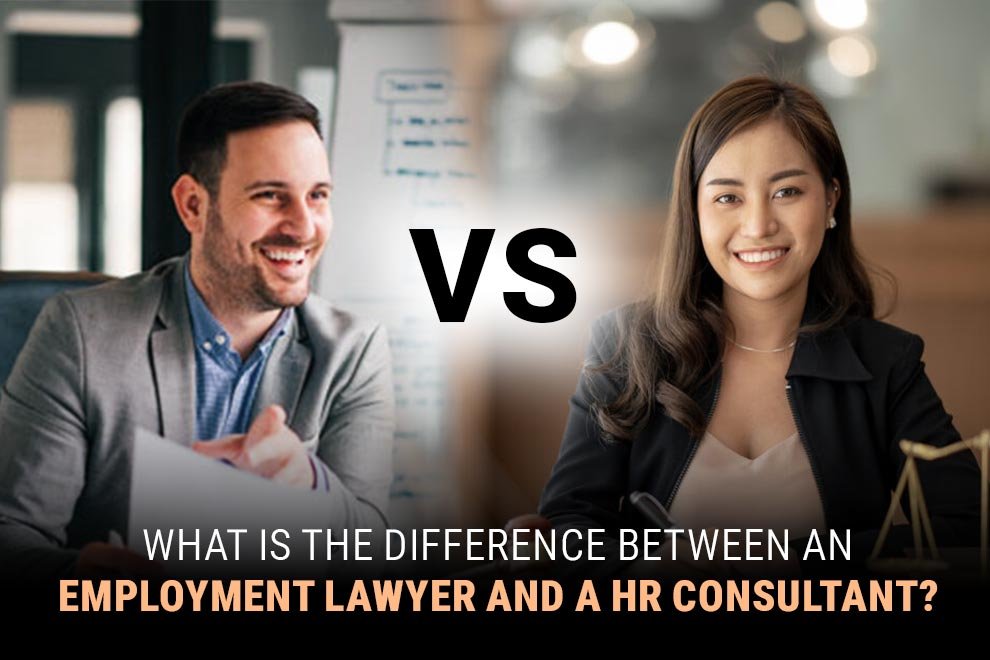Trying to decide between hiring an Employment Lawyer or an HR consultant? The distinction is often misunderstood, yet it can significantly impact how workplace issues are handled. In Australia, both professionals serve important but distinctly different functions in the employment relationship ecosystem. This article clarifies their roles, qualifications, and when it makes sense to engage each type of professional.
Key Takeaways
- Employment lawyers provide legal advice and representation, while HR consultants focus on people management and policy implementation
- Lawyers have formal legal qualifications and are regulated by law societies; HR consultants typically have HR qualifications but no single regulatory body
- Legal professional privilege only applies to communications with lawyers, offering an additional layer of protection in sensitive matters
- Some situations benefit from engaging both professionals, with lawyers handling legal risk and HR consultants managing implementation
- Cost structures differ significantly, with lawyers typically charging higher hourly rates while HR consultants often work on project or retainer bases
Roles and Core Functions
The fundamental difference between these professionals lies in their focus areas and the nature of their expertise.
Employment Lawyer: Scope of Work
Employment lawyers specialise in interpreting and applying employment law. Their primary functions include:
- Providing legal advice on the Fair Work Act, awards, and enterprise agreements
- Drafting and reviewing employment contracts
- Advising on terminations, redundancies, and restructures from a legal perspective
- Representing clients in courts and tribunals such as the Fair Work Commission
- Providing advice protected by legal professional privilege
HR Consultant: Scope of Work
HR consultants focus on people management and operational aspects of employment. They typically:
“When you engage an HR consultant, you’re getting practical workplace solutions rather than legal opinions. The value lies in implementation and operational expertise that complements legal advice.” – Stevens & Associates
Their core services include:
- Developing HR policies, procedures, and frameworks
- Designing performance management systems
- Conducting training and managing organisational change
- Handling recruitment and workforce planning
- Managing workplace culture initiatives
Key Differences in Deliverables
The outcomes from each professional differ significantly. Employment lawyers deliver legally binding advice and solutions that can withstand scrutiny in legal forums. HR consultants provide operational frameworks and practical tools to manage people effectively and maintain compliance.
Qualifications and Regulation in Australia
The regulatory landscape for these professionals varies dramatically, impacting accountability and standards.
Employment Lawyers
Australian employment lawyers must:
- Hold a law degree
- Complete practical legal training
- Be admitted to practice
- Maintain a current practising certificate
- Hold professional indemnity insurance
- Comply with continuing professional development requirements
Their credentials can be verified through state and territory law societies and legal services commissioners.
HR Consultants
The qualifications for HR consultants are less standardised:
- Many hold diplomas or degrees in human resources or business
- Some have membership with the Australian HR Institute (AHRI)
- Others may have industry certifications or specialised training
Unlike lawyers, there is no single regulatory body overseeing HR consultants, making reputation, references, and demonstrated experience particularly important when selecting one.
Legal Privilege and Risk Management
One of the most significant differences between these professionals relates to confidentiality protections.
Legal Professional Privilege
Communications with employment lawyers are protected by legal professional privilege when they are made for the dominant purpose of:
- Obtaining legal advice
- Preparing for actual or anticipated litigation
This privilege means these communications cannot be compelled to be disclosed in court proceedings, offering an additional layer of protection in sensitive matters.
HR Consultant Limitations
Communications with HR consultants do not enjoy the same protections. Their advice and reports may be discoverable in legal proceedings, potentially creating risk if sensitive issues are documented without legal oversight.
Joint Engagement Models
For complex matters, a hybrid approach often works best. Lawyers can provide the legal framework and strategic direction while HR consultants implement solutions and manage the people aspects. This approach maximises legal protection while ensuring practical execution.
Cost Structures and Value Considerations
The financial investment differs substantially between these professionals.
Employment Lawyer Fees
Employment lawyers typically charge:
- Hourly rates (commonly $350-$600+ per hour depending on seniority and location)
- Fixed fees for defined services (such as contract reviews or specific advice)
- Retainer arrangements for ongoing advice
HR Consultant Fees
HR consultants generally charge:
- Project-based fees for specific deliverables
- Day rates (typically $1,000-$3,000 per day)
- Monthly retainers for ongoing support
- Hourly rates (usually lower than lawyer rates)
The value equation depends on your needs. Legal advice represents higher upfront costs but may prevent expensive litigation. HR consulting typically costs less but focuses on operational rather than legal solutions.
When to Engage Each Professional
Different workplace scenarios call for different expertise:
When to Engage an Employment Lawyer
- Responding to unfair dismissal claims or adverse action allegations
- Defending workplace litigation
- Handling sensitive terminations with high legal risk
- Drafting employment contracts with complex terms
- Responding to regulator investigations
When to Engage an HR Consultant
- Developing or updating HR policies and procedures
- Implementing performance management systems
- Conducting workplace culture assessments
- Managing recruitment processes
- Providing training and development programs
Combined Approach Scenarios
- Major restructures or redundancy programs
- Complex workplace investigations
- Enterprise agreement negotiations
- Implementing significant workplace changes
Finding the Right Professional in Australia
When seeking either type of professional, consider:
- Industry experience relevant to your business
- Client testimonials and references
- Clear fee structures and engagement terms
- Communication style and accessibility
- Specific expertise in your area of need
For employment lawyers, check state law society directories and legal referral services. For HR consultants, the AHRI directory and industry networks can be valuable resources.
Conclusion
The choice between an employment lawyer and an HR consultant depends on whether you need legal protection and advice or operational HR support and implementation. In many cases, the most effective approach involves both professionals working in tandem – the lawyer addressing legal risks and the HR consultant implementing practical workplace solutions. When facing complex employment matters, consider consulting Stevens & Associates to determine the most appropriate professional support for your specific circumstances.
Also Read: What Kind of Lawyer Do You Need When Everything’s on the Line?










